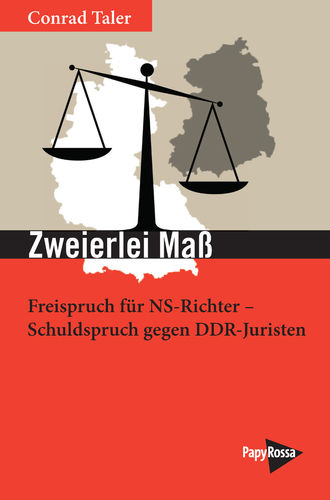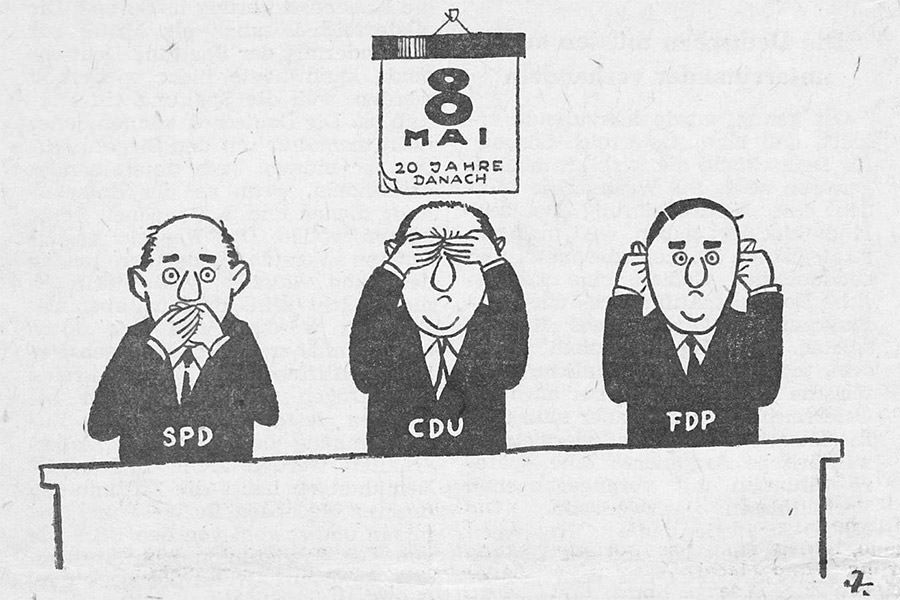07.05.2020
The book “Zweierlei Maß” by Conrad Taler has been published in its second edition
ON THE 75TH ANNIVERSARY OF MAY 8, 1945

The acquittal for Nazi crimes is not, as is often claimed, the result of a failure of the German judiciary; it was deliberately brought about, based essentially on a judgment of the Federal Court of Justice of 7 December 1956, which states that the conviction of a judge for obstruction of justice under § 336 requires “certain, not only conditional, intent”. This proof was difficult to provide without a corresponding confession. In order to remain unpunished, the henchmen of the unjust state only had to affirm that they had always adhered to the applicable laws. The Federal Court of Justice had no objections to this. On 25 May 1956, it decided that the National Socialist state could not easily be denied the right to have enacted strict laws for the protection of the state.
When, after the fall of the GDR, its judges were to be called to account, the German justice system was in a trap. According to current case law, they too had to be acquitted. This was opposed by the wish of Federal Justice Minister Klaus Kinkel (FDP) to delegitimize the GDR. In the breakneck manoeuvre to turn the tide, which the German justice system then carried out, not only did everything go overboard that had until then been regarded as a guideline for the prevention of justice, but also a number of principles of the constitutional state, such as the principle of equality or the prohibition of retroactive punishment under Article 103 of the Basic Law. It was of no use to the judges of the GDR when they declared that they had judged according to the laws in force. For the Federal Court of Justice, the “knowingness of the unlawful decision” was “regularly not in question” for them.
This setting of double standards is the focus of the book of the same name by Conrad Taler, which has now been published in a second edition by PapyRossa Verlag. The author repeatedly allows the Federal Court of Justice to have its own say. Among other things, the reader learns that in the opinion of the highest German criminal court, during the Cold War period “on both sides”, i.e. in the GDR and in the Federal Republic, “a ‘political justice’ was conducted with an intensity that is not always comprehensible from today’s perspective”. (AZ 5 StR 747/94).
 In the opinion of the Federal Court of Justice, a large number of former Nazi judges should have been called to account. The fact that this did not happen is “a serious failure of the German criminal justice system”. In the case of the former GDR judge Hans Reinwarth, who was sentenced to three years and nine months imprisonment, the Federal Court of Justice self-critically stated that it was not far-fetched to assume that a “fundamentally changed jurisdiction, without which his conviction would not be possible, could hardly be communicated to him as being fair”.
In the opinion of the Federal Court of Justice, a large number of former Nazi judges should have been called to account. The fact that this did not happen is “a serious failure of the German criminal justice system”. In the case of the former GDR judge Hans Reinwarth, who was sentenced to three years and nine months imprisonment, the Federal Court of Justice self-critically stated that it was not far-fetched to assume that a “fundamentally changed jurisdiction, without which his conviction would not be possible, could hardly be communicated to him as being fair”.
All in all, an exciting reading. It is recommended to all those who ask about the role of the judiciary or the reasons for the current voting behaviour of former GDR citizens. The well-known advocate in political criminal cases, Heinrich Hannover, writes in his foreword that anyone who reads the book with the readiness to take note of judicial injustice even in places where “everything is done according to the rule of law” would be left with some doubts “as to whether the claim and reality of our constitutional state actually correspond.”
Photo: The author Kurt Nelhiebel (left) alias Conrad Taler was awarded the Federal Cross of Merit on Ribbon in 2018 by the Mayor of Bremen, Dr. Carsten Sieling (right).
The BUXUS STIFTUNG is maintaining a website (in German language) of the author who was awarded the Villa Ichon Culture and Peace Prize. There you can find more of Conrad Taler’s striking cartoons, with which the journalist commented on the myth of the Federal Republic’s collective innocence: www.kurt-nelhiebel.de






